In the Shadow of Iwo Jima We Found Camaraderie and Peace With Grandsons of the Enemy
I landed on Iwo Jima for the first time in 1998. I was a young Marine sergeant serving as an infantry squad leader during a six-month deployment to Okinawa, Japan. Most who make the pilgrimage to the tiny island stay only a few hours. I was lucky enough to spend three days and two nights—not once but twice in visits that bookended my career.
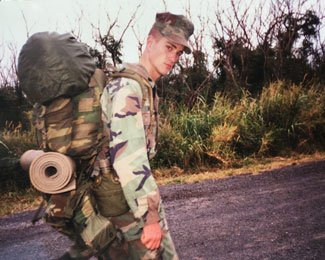
A young Adam Walker hikes during his first visit to Iwo Jima. Photo courtesy of the author.
During that first visit, we arrived with several cases of MREs and five-gallon water jugs. Our company gunny hiked us to a position where we dropped packs and staged gear before exploring the area. We climbed Mount Suribachi, crawled in caves, and viewed the rust-covered implements of war that still littered the island.
We assumed the prone position on the beach, looking across the landscape from a rifleman’s vantage, imagining what it must have looked like to our predecessors during the 36-day battle that claimed the lives of some 6,000 U.S. Marines more than a generation before.
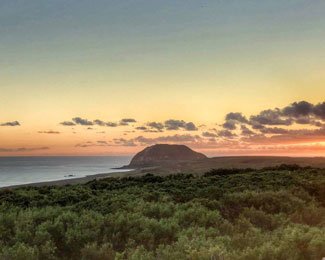
Adam Walker saw one of the most beautiful sunsets of his life on the island of Iwo Jima. Photo courtesy of the author.
We were surprised to find spent brass still scattered in the sand after all these years.
At night we rolled out our sleeping pads, ate chow, and listened as our gunnery sergeant read excerpts from Iwo Jima: Red Blood, Black Sand, Pacific Apocalypse. The descriptions of death and carnage stood in stark contrast to the gentle breeze and crashing waves that ushered in a restful night. I watched one of the most beautiful sunsets I’ve ever seen on Iwo Jima, aware that the night sky had been painted in smoke and fire a generation before.
Twenty years later, while serving an accompanied tour in Okinawa with my family, I returned to Iwo Jima—this time as a mastery gunnery sergeant. A handful of senior enlisted leaders from the Army, Navy, Air Force, and Marines descended on the island for a leadership summit with our counterparts from the Japan Ground Self Defense Force, Maritime Self-Defense Force, and Air Self-Defense Force. We shared lessons, techniques, and perspectives of enlisted leadership with each other during the day.
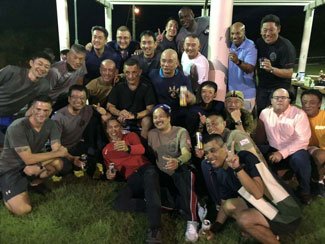
During his second visit to Iwo Jima, U.S. service members and their Japanese counterparts feasted on grilled meat and fish and toasted with Japanese beer and sake. Photo courtesy of the author.
That first night, our Japanese hosts prepared a barbecue. We feasted on grilled meat and fish, toasted with Japanese beer and sake, sang songs, and shared stories. Our laughter filled the same air that once held thunderous, deafening explosions. As we shared photos of our families, it became obvious that we were more alike than different. Our common humanity transcended culture.
Early the next morning, we ran to the top of Mount Suribachi to see a stunning sunrise and a calm sea. Together.
These memories shine with a warmth that eclipses the cold, bitter recollections of my days in combat.
Award-Winning Journalism in Your Inbox
Wars are primarily fought by young men. Combat is brutal, and the impacts last a lifetime. Those who survive come home, grow old, and think back on the confrontations of flesh and steel. War changes who you are, how you see the world, and how you live the rest of your life.
While you strive to move forward, echoes from the past demand attention. Developing perspective takes time. As I view life after combat, I am forced to reckon with those who went before me. Their experiences serve as an example and provide a model of hope for my generation of veterans in the wake of Iraq and Afghanistan.
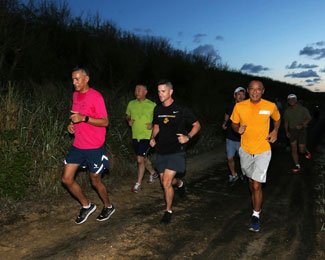
American and Japanese service members take a run to the top of Mount Suribachi to see a stunning sunrise and a calm sea. Photo courtesy of the author.
The Marines who fought in the Pacific during World War II could never imagine living peaceably with the Japanese. The enmity, bitterness, and hatred went bone-deep. Fighting ranged from massive bombardment to savage hand-to-hand combat. There was danger, exhaustion, fear, disease, and oppressive heat. For some, there was hopelessness.
Unimaginable to those who fought on the hostile shores of Iwo Jima, we found laughter, camaraderie, and peace on the same ground with grandsons of the enemy.
These experiences force me to reexamine some firmly held opinions. As a veteran of the war in Iraq, with three tours and wounds to my flesh and soul, I’ve often cynically stated that I cannot imagine eating falafel in Ramadi with my grandchildren. It’s a preposterous scenario and seems unfathomable. Yet, those who fought so viciously against one another in 1945 must have felt the same sentiment. It is a sobering thought.
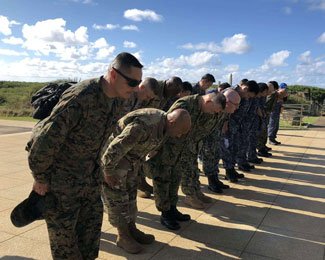
“As we shared photos of our families, it became obvious that we were more alike than different. Our common humanity transcended culture,” writes Adam Walker. Photo courtesy of the author.
During my final five years in uniform, my family and I lived in a small Okinawan community. I believe the lush, green scenery and humid, salty air—combined with friendly, gentle, and unhurried people—helped to soften the hardness I developed from war.
Some of our most fond memories are from this season of life. Surely the generation of Marines who fought in the Pacific could not imagine such a thing.
As I ponder the brutality of combat and piece together the wreckage of life afterward, I am encouraged. They say time can heal all wounds. I don’t subscribe to that sentiment. Some injuries are so deep that we carry them to our graves.
Our Journalism Depends on Your Support
But history bears witness that wounds, hatred, and conflict don’t have to be inherited by our children’s children. I’ve witnessed flowers growing in shell holes and heard birds singing in places where the cry “Corpsman up!” once rang out.
There is hope.




Comments are closed.